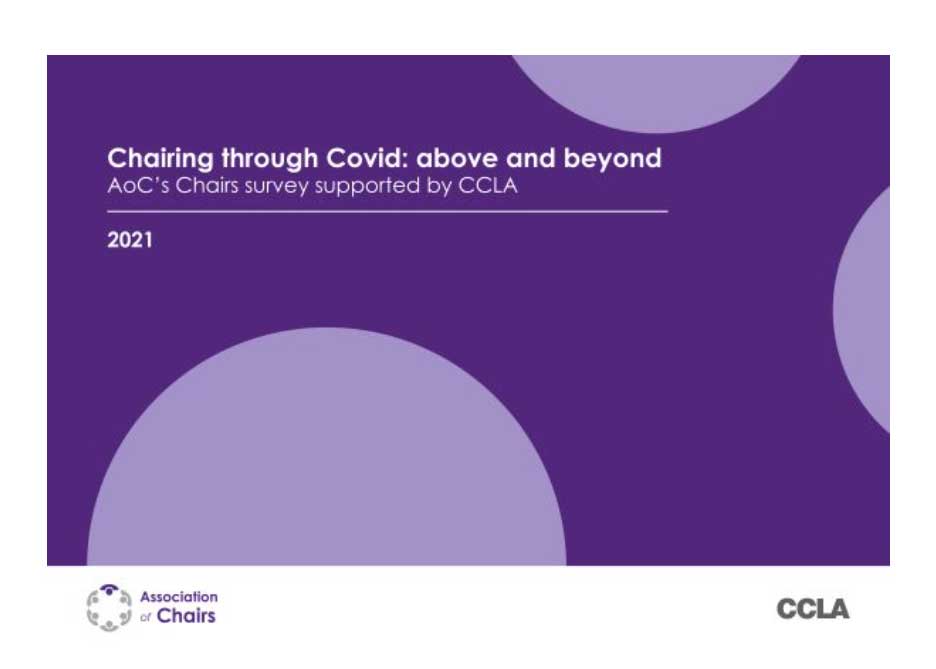Testing times for governance and Chairs
As demand for charity services soars, more needs to be done to support their Chairs, many of whom are running on empty

GOVERNANCE
Image: Istock

Rosalind Oakley
CEO, Association of Chairs
Issue 64 | February 2023
Charities are facing mounting challenges and in many of them much of the burden falls on the shoulders of a voluntary Chair. Especially in the roughly 80% of charities that have no paid staff. As a sector we need to do more to recognise and alleviate those pressures. At the Association of Chairs, we see those pressures first hand. So what do we know and what does this mean for the role of Chairs?
Chairs go above and beyond
Our report Chairing through Covid: above and beyond clearly showed the efforts Chairs will go to when the charity is under pressure.
During Covid, Chairs reported significantly increasing the amount of time spent on their role. Two thirds (62%) reported spending four or more days a month and nearly a third more than seven days a month.
Despite the challenges, 44% of respondents said their motivation for the role had increased during the pandemic compared with 13% whose motivation decreased.
The pandemic depleted reserves of energy and finances
However, many Chairs and charities emerged from the pandemic with depleted reserves. “Everyone is voluntary and, quite frankly, Covid has left us exhausted, especially the co-founders,” said one survey respondent.
The demands on Chairs continue to grow
The cost-of-living crisis is adding to the pressure as charities face growing demand for their services and rising costs – especially from escalating energy bills and pressure on wages as some, notably in the health and care sector, struggle to recruit.
Sometimes the Chair is dealing with these issues directly, or sometimes they are supporting the CEO and staff team. Many must navigate their boards through some difficult decisions. In some cases, they are looking at very real threats to the viability of the charity.
Our recent event on ‘Closing a Charity Well’ revealed the variety of difficult emotions boards grapple with as they consider their options. It is the Chair’s role to ensure the board faces up to such difficult decisions in a timely and constructive way that safeguards the people they serve, and also keeps the charity legally compliant.
80%
of charities have no paid staff
44%
of chairs said their motivation for the role increased during the pandemic
54%
of Chairs said nothing had been spent on training or support for them in the past year
Signs of strain
During the pandemic, we saw significant changes in board dynamics. Happily 42% of respondents said board relationships had improved since the pandemic, but 14% reported relationships had worsened.
Among those chairing organisations that employ a senior leadership team, a similar percentage (41%) reported improved relationships with their Chief Executive (8% said it had worsened).
Anecdotally we are hearing more instances of board disputes and tension. Possible factors include:
- Exhaustion from the demands of the pandemic and cost-of-living crisis
- Anxiety about the financial position of the charity
- Deterioration in interpersonal dynamics from online meetings, with fewer opportunities to get to know each other
Lack of support
Despite the very real demands, our sector does little to support these key volunteers. Our study highlights, not for the first time, the lack of training and support offered to Chairs, despite the demands of the role. Just over half (54%) said nothing had been spent on training and support for themselves in the past year, and 30% said less than £100 was spent on them.
How can you help?
If you are working with a charity board, or are a trustee, take some time to understand the perspective of the Chair and to offer some support. Do they want to talk over their biggest fears and challenges right now? Can you suggest ways forward that are proportionate to the capacity and capability of the charity and its risks and opportunities? Can you offer encouragement and perhaps help with the work of managing other stakeholder relationships?
And if they haven’t yet discovered the Association of Chairs, please do send them our way and offer to pay the membership fee! Our resources, events and networks will help them feel less alone.
“Just over half (54%) said nothing had been spent on training and support for themselves in the past year.”
To find out more about the Association of Chairs visit our website.
Membership fees are either £60 or £120 depending on size of organisation. Bursaries are available.


